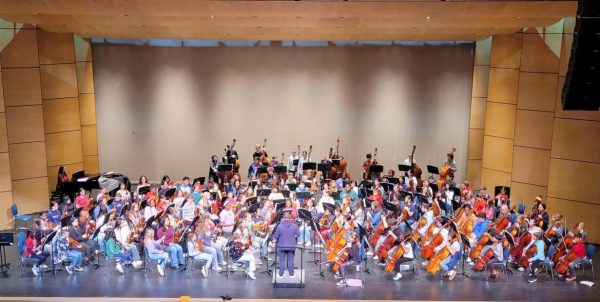Managing Good Grades, Sleep and Extracurricular Activities
October 29, 2014
As I type this story, I think about how I could be doing something else. Yep, I type this during my second period Journalism class that I normally would spend getting some AP World History homework done or looking up facts for a Chemistry project. I wish that it didn’t always have to be that way, but with me taking a great number of higher level classes (and also being a massively lazy oaf), it seems that I never have enough time to get work done AND have time for myself. But as my mother tells me, “Do the people who get Straight A’s AND do extracurricular activities AND have lots of free time have 2 heads?” I don’t know. Do they?
Peering through my looking glass, I’m not the only one that believes that school can sometimes be a little too stressful to allow for other things in life.
“I hate how every teacher thinks that they’re the only class that you have and then give us workloads of homework,” Sophomore Jazmin Medina argued, “and then they expect you to be all cheerful and awake during class when you can’t be because you went to sleep at 2 a.m. from doing your homework all night.”
According the APA (American Psychological Association), at least 55% of students reported suffering from at least a moderate amount of stress in the past year. A lot of these students use sedentary and non-active activities to cope. The problem that this causes is an unnecessary reliance on things that could even worst affect your achievement in school, rather than enrichment activities that physically and mentally improve the mind. Stress is also a cause for several students (up to 21%) to skip homework and other responsibilities. The numbers obviously don’t lie, so what can we do about it?
There are many ways to kick the school grind, but not all ways are best suited for everyone. I oftentimes try listening to soft classical music when doing my homework as recommended by many sources, but I tend to get too unnerved by the calmness and change it to something more upbeat. That, or I end up being unable to focus from getting into the music too much. Sometimes I fall asleep halfway into an album. As you can see, while I am big into music, it does not exactly assist my academic achievement. But that might help you! From fast paced dance artists to instrumental piano music, studies have shown that music can be beneficial—or detrimental—to your study habits. It all depends on you.
“I like to listen to my favorite music while doing my homework after school to relieve stress,” stated Medina.
If you’re a little more internet savvy, on the popular social media site, Tumblr, you can get schoolwork-based information from blogs dedicated entirely to studying. On these blogs, you can find masterposts with links to popular study techniques, free textbooks online and more.
If you’re a bit more of a traditionalist, remember to write down your homework in your planner. Post-it notes and highlighters are your best friends. Writing-based study techniques such as graphic organizers or outlines really help. A new learning technique called “spaced repetition” comprises of breaking up notes or ideas into small chunks. Learn a bit first, review later and learn more.
Another very important part of doing well in school is remembering to get enough time of sleep every night. Teenagers need about 8-9 hours of sleep a night.
Freshman Thyvan Quang recalled her daily weekday routine in regards to sleep. “I get home and do my homework until it’s finished but I ALWAYS take a nice long nap.”
All in all, succeeding at school is something that is all about you as the student. You decide what your level of achievement is. Getting good grades and taking difficult classes is important, but if you’re too stressed to enjoy the quality of your work, what’s the point? When it comes to school, try your best but let yourself live a bit.











